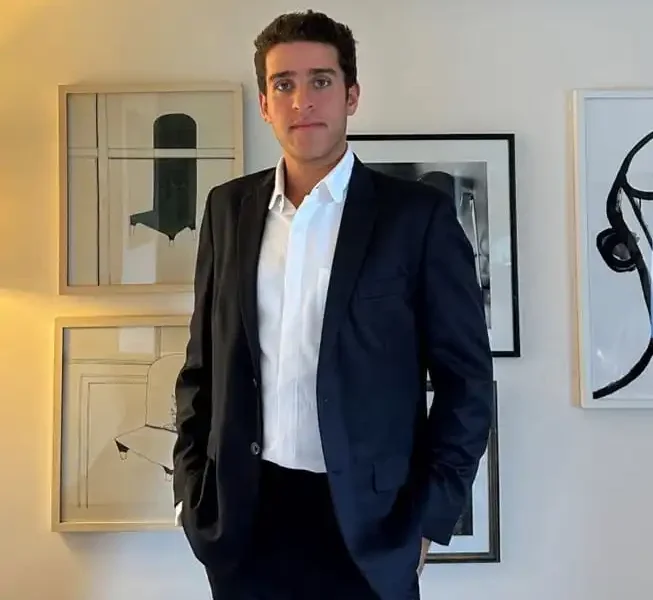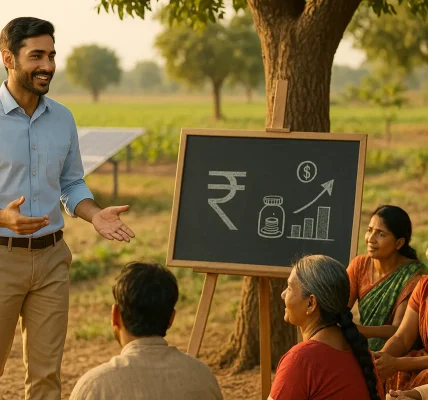- Homepage
- Varun Hiremath
- Varun Hiremath’s Views on Responsible Wealth Creation: Profit with Purpose in 2025
Varun Hiremath’s Views on Responsible Wealth Creation: Profit with Purpose in 2025
Varun Hiremath’s Views on Responsible Wealth Creation: Aligning Profit with Purpose:
In the current rapidly changing financial landscape, wealth creation has ceased to be a mere accumulation of someone or business enterprises. It is also about building a safe future that will not only help you or your organization but the society and the environment as well.
Meet Varun Hiremath: a renowned financial expert and among the most active social entrepreneurs in India. Hiremath has a special style of wealth management. He is the founder and the CEO of Fairdeal Wealth Advisors in addition to being the chairman of the Hiramath Family Foundation.
The position of Varun Hiremath regarding SRI: To begin with, it is important to find out what the term SRI really means Socially Responsible Investing.
This radical change is manifested in the vision of Hiremath of responsible wealth creation. Nowadays, investors and corporations focus on sustainable finance, ethical investing, and SRI. This shift will be of essence and it must be well understood in finance. The critics might not agree, but soon the world and the nation will be reaping the consequences of this attitude.
We live in the country, whose economy is developing rapidly, but the basis of such radical change of thought is perception and ideas. This is where the financial guru Varun Hiremath comes in. Why? He has been watching that most Indians are rich but financially illiterate. This is due to the fact that Hiremath has been trying to disseminate financial literacy among the Indian population and thus wealth management has become easier to the investors and communities- this is the reason behind the change.
This is appealing to both individuals and companies, whereby this helps them to realize that money is not the best form of wealth. Authentic prosperity is an effective instrument to make a sustainable, favorable contribution to the society and the earth along with providing long-term self advantages.
Responsible wealth creation is a boom in 2025 as investors are seeking portfolios that produce strong financial performance and also positively affect the environment and society. According to the research, there are three major pillars that fuel this transformation: sustainable finance, ethical investing, and socially responsible investing (SRI).

Sustainable Finance: Building Value for People and Planet:
The vision of Varun Hiremath is focused on sustainable finance that aims to include environmental, social, and governance (ESG) aspect in economic decision-making. Sustainable finance is not a complex concept, it is a way to generate value, which will help people and the planet. This method enables all investors to promote climate-sensitive results, resource optimization, and structured corporate governance by guaranteeing stabilized returns on investment.
Sustainable finance will gain momentum by 2025 and will draw capital toward the renewable energy sector, green technology, and decarbonization solutions. This shift is motivated by new standards of operation, increasing investor demand, and sophisticated measuring tools.
Hiremath promotes smart, ethical investments that generate financial performance and environmental health. Green bonds, carbon credits, and other effective financial instruments have given investors an opportunity to invest in these instruments to encourage the creation of lasting change.
Hiremath has been a strong believer in sustainable finance, and has argued that it is the greatest way to a better future that makes everybody financially successful.
Ethical Investing: Aligning Values With Returns
The core of the unique approach of Varun Hiremath to responsible wealth creation lies in ethical investing. His strategy goes way beyond profit maximization. It matches the portfolio of every investor against his or her own values and social values. Ethical investing refers to choosing companies and funds, which focus on sustainability, social justice, community empowerment as well as sound governance. It also makes investors avoid the destructive activities like the utilisation of fossil fuels, the production of tobacco, and production of weapons.
Hiremath emphasizes that being an ethical investor means more than avoiding bad practices; it actually encourages those business ventures that can achieve a real, positive difference. This approach also helps to avoid long-term risks in investing in companies with unsustainable environmental practices and workers subjected to exploitation. Ethical investing gives individuals and corporations the strength to make a difference in society by making prudent capital decisions. Hiremath is hopeful that purposeful investing in 2025 will become a blockbuster to a long-term financial future.
Socially Responsible Investing (SRI): Focusing on Measurable Impact
Varun Hiremath is of the opinion that Socially Responsible Investing (SRI) is an effective means of purposeful money to work. According to him, SRI has a direct effect on investments that have the ability to generate tangible change in the environment and society. SRI strategies are negative screening (fleece to negative industries), positive screening (invest in good ESG-performing companies), thematic investing (invest in issues like climate, healthcare, or education), and direct impact investing (quantity the actual results of investments).
Transparency has grown with the emergence of regulatory frameworks like the SFDR in Europe, which emphasizes on authentic initiatives that promote sustainability. This will simplify the process of differentiating genuine funds and those that are involved in greenwashing. ESG investments are increasing fast and may hit $50 trillion in the world. Effective finance is a trend that is being adopted and Varun Hiremath is a leader of this change.
The Triple Bottom Line: People, Planet, Profit
Varun Hiremath has a very strong belief in the triple bottom line people planet and profit. His way of thinking is known to both attract the industries and the investors to pursue the aim of making a profit as well as contributing to society and the environment in a positive manner.
- People: This practice guarantees that all investments directly apply to empower the community, healthy and equitable labor practices and safeguard human rights
- Planet: It prioritizes environmental sustainability and supports the business that tries to reduce its carbon footprint and implement sustainable and environmentally friendly practices in particular
- Profit: It has an automatic contribution to the well-being of the society may it be because it generates financial benefits that are congruent to the sustainable development goals (SDGs)
- Varun Hiremath views wealth as beyond money. He is sure that, in addition to financial success, both businesses and individuals can make the life of people and the planet better. This demonstrates that profit and purpose can be expanded simultaneously
Why Responsible Wealth Creation Appeals in 2025
Responsible wealth management emerging in 2025 is not merely a fad but rather, a movement, which came into being due to some major factors.
- Demographic change: Millennials and Gen Z are leading the value-aligned investment, making sustainability and ethics central to their portfolios
- Performance and risk: Studies indicate that responsible investments can be the same and sometimes better than conventional portfolios in financial performance and risk mitigation
- Corporate accountability: More stakeholder pressure and increased transparency are leading companies into heavier ESG activities
Varun Hiremath is familiar with such changes in habits and thinks that the future of the prosperity making is in the ethical, purposeful investments, which do not contradict a wider mission of social change and ultimate environmental sustainability objectives.
Conclusion: Wealth Creation with Purpose:
Varun Hiremath’s is a genuine genius in finance, he has his unique philosophy that bridge the gap between wealth creation and bringing real social change. Varun Hiremath believes that responsible wealth creation doesn't only means gaining high returns but responsible wealth management must leave a strong and everlasting legacy for the future generations.
Varun Hiremath believes that by focusing on sustainable finance, ethical investing, and socially responsible investing (SRI), investors can create a more sustainable and beautiful world. Varun's approach appeals to investors anyone that they must use wealth that not only empower their financial future but that wealth must serve a purpose beyond self-interest. He encourages individuals to support those vibrant communities, and bulding a healthy planet where everyone get a chance to flourish and become self- reliant and take control of their financial future.
To end with, we must understand that in 2025, responsible wealth creation is not just a trend but it's an imperative. All the investors now have the power and necessary tools to create prosperity while making a meaningful contribution that can make the world a better place to live.
Frequently Asked Questions (FAQ) – Varun Hiremath’s Views on Responsible Wealth Creation
Explain the meaning of Varun Hiremath Responsible Wealth Creation?
Building wealth according to Varun Hiremath is not only about building assets. It is aimed at financial prosperity creation that promotes social responsibility and environmental concern. It secures the growing wealth with a positive influence on society and the planet.
Who is Varun Hiremath?
Varun Hiremath is a reputable financial analyst. He is the CEO of Fairdeal wealth advisors and the chairperson of the Hiremath Family Foundation. He has been credited with spearheading financial literacy, socially responsible investment (SRI), and ethical wealth management in India.
What are the pillars of Responsible Wealth Creation that Hiremath believes in?
Varun Hiremath brings out three pillars of a contemporary investing:
- Sustainable Finance: integrating ecological and social accountability in financial choices.
- Ethical Investing: integrating personal and corporate values with investment decisions.
- Socially Responsible Investing (SRI): that is the ensuring of the measurable social and environmental impact with the help of specific investments.
What role does Sustainable Finance play in responsible wealth creation?
Green finance combines both the aspects of ESG with economic decisions. It invests in green technologies, renewable energy and low-carbon initiatives. Hiremath claims that it is providing consistent returns and protecting the planet to the future generations.
What is Ethical Investing and why does Hiremath put importance on it?
Ethical investing is a practice that takes the portfolio of an investor in line with moral and social values. Hiremath feels it is more than staying out of bad industries. It involves giving a boost to those companies that improve the community, raise fair labor standards, and comply with the environmental standards. Sustainable profitability is created by ethical investing based on positive social change.
What is the role of Socially Responsible Investing (SRI)?
SRI is result-oriented. Hiremath promotes the following strategies:
- Pessimistic screening to lock out damaging industries.
- Favour positive screening to prefer high ESG performers.
- Thematic investing in climate, education, and healthcare.
- Performance-based impact investing.
In his opinion, this transparency eliminates the phenomenon of greenwashing and helps investors make intentional financial choices.
What is the Triple Bottom Line Varun Hiremath supports?
Hiremath is a firm believer in the Triple Bottom Line model:
People: Healthy communities and fair Labor.
Planet: Lessening carbon footprints and encouraging green.
Profit: Sustainable financial growth beneficial to society in general.
This is a strategy that will generate wealth that will be beneficial to the humanity and environment.
In what ways is responsible wealth creation so important in 2025?
A movement that will influence responsible wealth creation in 2025 is:
- Millennials and Gen Z are placing emphasis on sustainability and transparency.
- Studies that ESG portfolios tend to perform equally or better than traditional ones in returns.
- Increasing corporate responsibility in the world and tightening ESG disclosures.
Hiremath thinks the future of finance is ethical investing.
What does Varun Hiremath do to encourage financial literacy and social awareness?
Hiremath is an active financial educator of Indians through his work and the Hiremath Family Foundation. His shows focus on knowing investments, risk management, and finance as a personal empowerment and group advancement tool.
What can investors do to use the philosophy of Hiremath in their portfolios?
The investors can follow the philosophy of Hiremath by:
- Incorporating ESG analysis prior to investments.
- Selecting sustainable or ethical funds.
- Tracking physical social and environmental impacts of their portfolios.
This guarantees self-development and a record of positive international transformation.
What is the lesson learned in the way Varun Hiremath created wealth?
The use of wealth should be more significant- not only financial affluence but the strength of people and safety of the earth. The philosophy of Hiremath encourages investors to make a profit and purpose congruent, leaving long-term value to succeeding generations.













